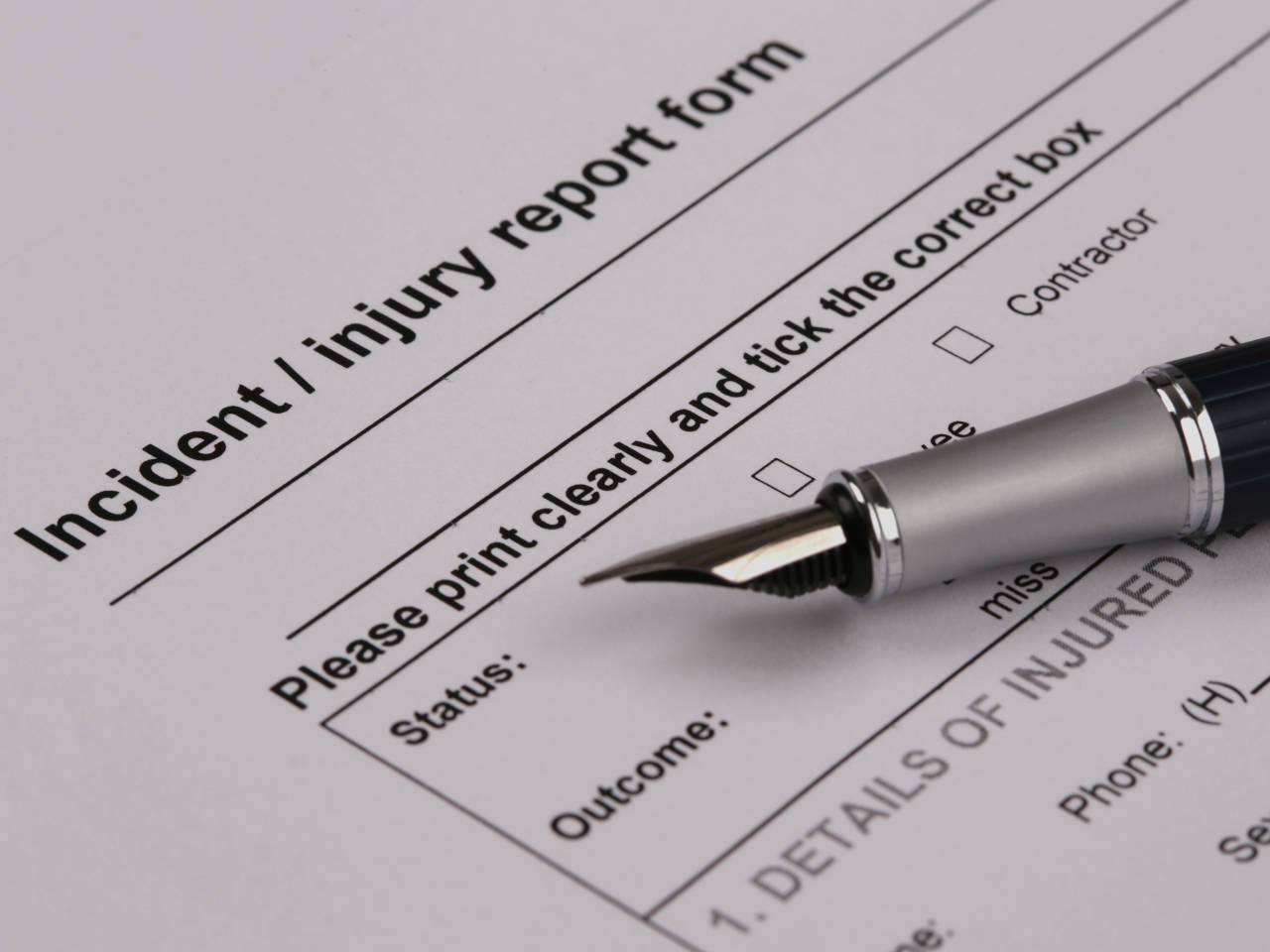
- Learn about employer obligations for recording and reporting workplace accidents.
- Understand what RIDDOR is, why it is important, and how to record an accident or injury at work.
- Discover what injuries, diseases and incidents to report and how to let HSE know about an incident.
Despite employers’ best efforts to prevent accidents in the workplace, employees can, unfortunately, be injured or killed at work. Employers are legally obliged to record and report specific injuries, illnesses and incidents. This guide provides help and advice on how to comply with accident reporting regulations, which are more commonly known as RIDDOR.
In 2017-18, there were an estimated 555,000 non-fatal injuries self-reported by workers, while 144 employees were fatally injured. A further 1.4m staff reported suffering from a work-related illness.
Working days lost to workplace injuries cost UK businesses an estimated £5.2bn.
Employers are legally obliged to record certain injuries, illnesses and incidents, and report them to the Health and Safety Executive (HSE). In 2018/19, 69,208 were recorded.
Reduce the risk and impact of workplace accidents with our Health and Safety Awareness online training course, which helps staff identify common workplace hazards. Developed by experienced health and safety consultants, our health and safety courses train staff on how to record and report workplace incidents properly.
What is RIDDOR and what does it stand for?
The legislation covering the reporting of workplace injuries is the Reporting of Injuries, Diseases and Dangerous Occurrences Regulations 2013, known as RIDDOR.
The RIDDOR regulations relate to “reasonable persons” reporting incidents and injuries. The definition of responsible persons under RIDDOR generally refers to employers, but they can also be various managers, the self-employed and people in control of premises.
Employers must report the following:
- Fatal injuries
- Specified non-fatal injuries
- Occupational diseases
- Dangerous occurrences (also referred to as ‘near misses’)
- Incidents resulting in an employee being away from work for seven days or more
- Incidents involving injured members of the public being taken to hospital
- Incidents involving gases where people have been taken to hospital
Why is RIDDOR important?
RIDDOR exists to ensure employers and employees are kept safe at work and encourages everyone to follow health and safety procedures to reduce the chance of injuries and accidents.
If an accident does happen at work, the regulations ensure employers are held responsible for negligence, bad working practices and poor office safety.
RIDDOR also allows the HSE to keep track of workplace accidents and use the information to identify common occurrences and put measures in place to prevent them.
Employers who fail to comply with RIDDOR face an unlimited fine and a possible prison sentence.
Employer responsibilities
If an incident occurs, the following RIDDOR process is recommended:
- Ensure there is no immediate risk of danger and that the employee affected receives appropriate medical attention. Businesses are legally required to have a designated first aider and first aid kit available.
- If an employee discovers the incident, they should report it to a manager or supervisor.
- The company should record details of the incident. You must keep a record of any reportable death, injury, accident, injury lasting longer than seven days, disease or dangerous occurrence. This allows you to track common incidents and take steps to prevent them.
- Companies with more than ten employees or those that own or occupy a mine, quarry or factory are legally required to have an accident book that records all the details of an incident that you would submit to the HSE. All reported RIDDOR incidents must be recorded. RIDDOR records must be kept for at least three years, but it is recommended that you keep them for up to six years in case of any legal issues.
- Incidents covered by RIDDOR must be reported to the HSE.
How to report an incident
If an incident falls under RIDDOR, you must report it to the HSE within ten days. If the incident leads to more than seven days’ absence from work, it has to be reported within 15 days. Cases of occupational disease must be reported as soon as the person receives a diagnosis.
You must report the incident using the appropriate form on the HSE website. A telephone service is also available for RIDDOR reporting of fatal/specified incidents only – call 0345 300 9923 (opening hours Monday to Friday 8.30 am to 5 pm) to file a report.
You have the option to download the RIDDOR report form, so you have it for your records.
An investigation into what happened should be carried out and a decision made as to whether it was preventable. If it is determined it was preventable, a list of suggested measures to prevent future incidents should be drawn up.
Examples of reportable accidents and incidents
Death
All employee and non-employee deaths resulting from a work-related accident must be reported under RIDDOR. This includes deaths that occur within a year after a workplace accident where the accident is the cause of death.
Suicides and cases of self-harm are not reportable.
Injuries
Slips, trips and falls are common incidents that lead to injuries in the workplace. Injuries that must be reported include:
- Fractures (not including thumbs, fingers and toes).
- Amputation of a hand, arm, finger, thumb, leg, foot or toe.
- Loss or reduction of sight in one or both eyes.
- Unconsciousness caused by a head injury or asphyxia.
- Crush injury that causes damage to internal organs.
- Scalping of skin that requires hospital treatment.
- Injury from working in an enclosed space that leads to hypothermia or heat-induced illness or requires resuscitation or hospital treatment for more than 24 hours.
- Burns covering over 10% of the body, or damaging the eyes, respiratory system or other vital organs.
Occupational diseases
Reportable diseases that have likely been caused by, or made worse by, the person’s current work. It must also be one of these eight conditions:
- Carpal tunnel syndrome
- Cramp of the hand or forearm
- Tendonitis or tenosynovitis
- Occupational cancer
- Occupational dermatitis
- Hand-arm vibration syndrome
- Occupational asthma
- Exposure to a biological agent
Dangerous occurrences
‘Near-miss’ incidents that could have caused harm must be reported. They include:
- Unintentional structural collapses.
- An explosion or fire which stops work for more than 24 hours.
- Hazardous escape of substances.
- Malfunction of breathing apparatus.
- Electrical discharge from overhead power lines after contact with equipment.
Gas incidents
Certain incidents involving gas must be reported to the HSE.
Distributors, fillers, suppliers and importers of flammable gas must report gas-related incidents where someone dies, loses consciousness or is taken to hospital as a result of an injury.
Registered gas engineers are required to provide details of gas appliances or fittings they consider to be dangerous that may lead to deaths, the loss of consciousness or hospital treatment.
Complying with record keeping and RIDDOR reporting
As an employer, you must comply with RIDDOR to protect the health and safety of your workforce.
Staying on top of records and reporting accidents will ensure you are equipped to manage risks and prevent future injuries, accidents and incidents of ill-health.
Reduce your business risk for new employees with our Health and Safety Induction online training course. Specially designed for new starters, it educates staff on their responsibilities including how to report and record a workplace accident.

Adam Clarke
Managing Director (Consulting)
